

Altered brain activation during visuomotor integr... [J Neurosci. 2011. Neuroscience Sheds New Light on Creativity - Rewiring the Creative Mind. Get rid of stuffed or running nose without drugs - Parapsychology articles and blog. Nasal congestion, stuffy nose, runny nose – these are common problems experienced by everyone, usually many times a year.
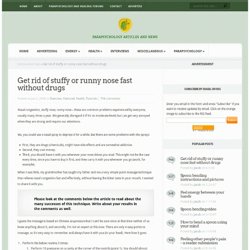
We generally disregard it if it’s on moderate levels but can get very annoyed when they are strong and require our attentions. Yes, you could use a nasal spray to depress it for a while. But there are some problems with the sprays: First, they are drugs (chemicals), might have side effects and are somewhat addictive. Second, they cost money. When I was little, my grandmother has taught my father and me a very simple point massage technique that relieves nasal congestion fast and effectively, without leaving the bitter taste in your mouth.
Please look at the comments below the article to read about the many successes of this technique. I guess the massage is based on Chinese acupressure but I can’t be sure since at that time neither of us knew anything about it, and secondly, I’m not an expert at this now. Do it with a very mild pressure. Marijuana might cause new cell growth in the brain - health - 13 October 2005. A synthetic chemical similar to the active ingredient in marijuana makes new cells grow in rat brains.
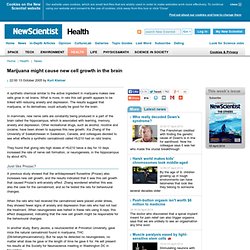
What is more, in rats this cell growth appears to be linked with reducing anxiety and depression. The results suggest that marijuana, or its derivatives, could actually be good for the brain. In mammals, new nerve cells are constantly being produced in a part of the brain called the hippocampus, which is associated with learning, memory, anxiety and depression. Other recreational drugs, such as alcohol, nicotine and cocaine, have been shown to suppress this new growth. Xia Zhang of the University of Saskatchewan in Saskatoon, Canada, and colleagues decided to see what effects a synthetic cannabinoid called HU210 had on rats' brains.
They found that giving rats high doses of HU210 twice a day for 10 days increased the rate of nerve cell formation, or neurogenesis, in the hippocampus by about 40%. Just like Prozac? Journal reference: Journal of Clinical Investigation (DOI:10.1172/JCI25509) Your Perception of Gravity Is All Relative, Study Finds. In a discovery that could turn science on its head, researchers now find that you are a better judge of how objects fall when you are upright than when you lie on your side.
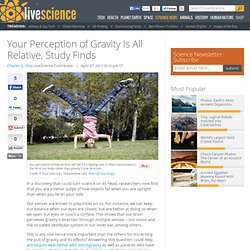
Our senses are known to play tricks on us. For instance, we can keep our balance when our eyes are closed, but are better at doing so when we open our eyes or touch a surface. This shows that our brain perceives gravity's direction through multiple senses -- our vision and the so-called vestibular system in our inner ear, among others. Still, is any one sense more important than the others for discerning the pull of gravity and its effects? Answering this question could help astronauts deal better with microgravity as well as patients who have problems with their stability, such as those with Parkinson's disease and muscular dystrophy.
The scientists found that volunteers were typically better judges of how objects fall when they were upright than when on their sides. Oddly, Hypocrisy Rooted in High Morals. Morally upstanding people are the do-gooders of society, right?
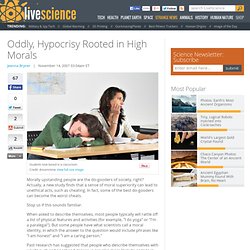
Actually, a new study finds that a sense of moral superiority can lead to unethical acts, such as cheating. In fact, some of the best do-gooders can become the worst cheats. Stop us if this sounds familiar. When asked to describe themselves, most people typically will rattle off a list of physical features and activities (for example, "I do yoga" or "I'm a paralegal"). But some people have what scientists call a moral identity, in which the answer to the question would include phrases like "I am honest" and "I am a caring person. " Past research has suggested that people who describe themselves with words such as honest and generous are also more likely to engage in volunteer work and other socially responsible acts.
But often in life, the line between right and wrong becomes blurry, particularly when it comes to cheating on a test or in the workplace. Why cheat? Why would a person who thinks of himself as honest cheat? The Neuroscience of Self-Esteem, Self-Criticism and Self-Compassion. All the emphasis on self-esteem building in recent decades has done little to instruct people on what to do when they hit a bump in the road.
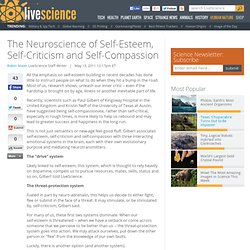
Most of us, research shows, unleash our inner critic – even if the hardship is brought on by age, illness or another inevitable part of life. Recently, scientists such as Paul Gilbert of Kingsway Hospital in the United Kingdom and Kristin Neff of the University of Texas at Austin, have suggested being self-compassionate, rather than self-critical, especially in rough times, is more likely to help us rebound and may lead to greater success and happiness in the long run. This is not just semantics or new-age feel-good fluff.
Gilbert associates self-esteem, self-criticism and self-compassion with three interacting emotional systems in the brain, each with their own evolutionary purpose and mediating neurotransmitters. The "drive" system The threat-protection system. Paranoid or Placid? Brain Scans Show Pot's Effect on Mind - MSN Health - Health Topics.